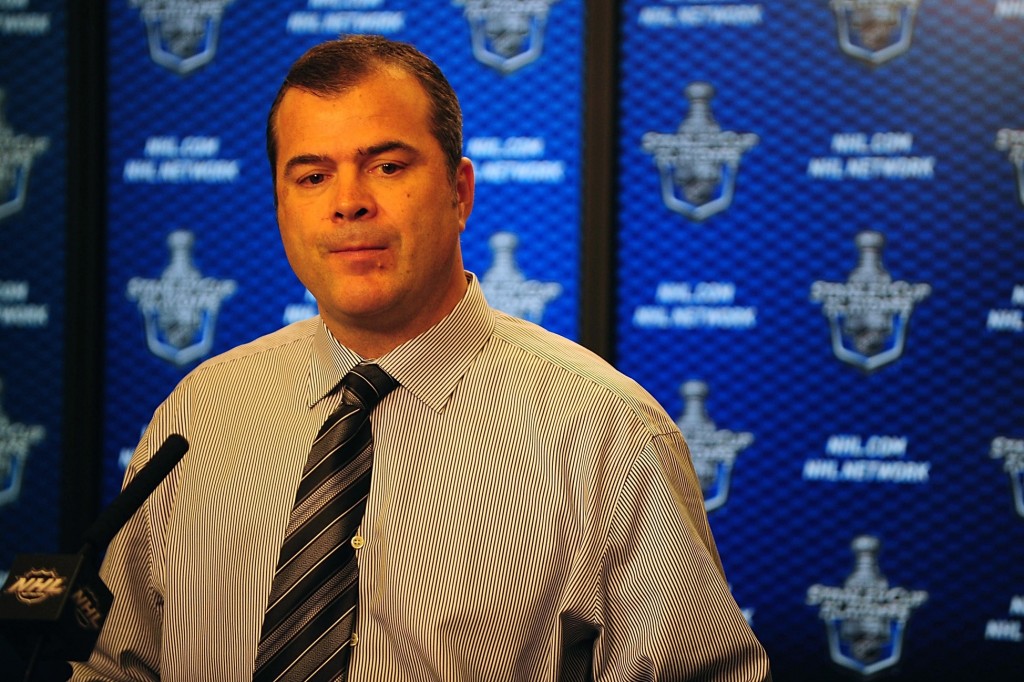This post isn’t so much about Daniel Paille (although Paille is still a guy who couldn’t get a job at league minimum for the past half a year) than it is about the worrying decision making amongst the Rangers hierarchy.
Let’s give a little bit of credit to Paille to begin with. Paille was a key member of the Boston Bruins once highly thought of fourth line along with Gregory Campbell and (correct me if I’m wrong) Shawn Thornton, a line that helped the Bruins win a Stanley Cup. Paille has 172 regular season points in the NHL and has carved out a solid NHL career as a depth forward once coming a goal shy of a 20 goal season. It’s fair to say Paille has some ability and has helped previous teams win.
Now let’s get back to the Rangers and their decision to bring in Paille despite other major and more immediate roster needs and facing an already restrictive cap situation. Paille’s arrival will likely change very little (I hope I am wrong). While it is refreshing to see Alain Vigneault admit the penalty kill is struggling and for once seen offering some frankness to the media and fanbase, it is maybe a sign that he is not seeing the greater issues. And by his decision to bring in Dan Paille, maybe neither does General Manager Jeff Gorton.
The penalty kill is broken. The Rangers over pursue on the penalty kill. The players, as they do at five on five, leave the Rangers crease far too unprotected. Just go back to the Caps game to see how bad it has all become. Justin Williams (amongst many others) was in a different zip code to the Rangers defenders. In general there is a lack of care and attention around Henrik Lundqvist’s net, but above all it is the overly aggressive play on the penalty kill that, in my humble opinion, is the major issue.
Yes, the Rangers lost a key penalty killer because of cap concerns when they decided to move on from Carl Hagelin. Yes the team lost Derek Stepan – another major PK guy – for an extended period of time this season and apparently when Jarrett Stoll left, the penalty kill statistically went into a tailspin (via Andrew Gross on Twitter, Rangers opponents have a collective 31.9% PP rate since Stoll was waived) but fundamentally the same unit that has been among the league’s best for several years remains intact.
Look at the numbers. Last year the Rangers were 6th in the league on the PK with a strong 84.3% kill rate. The year before the Rangers were 3rd in the league with 85.3% and the year before that they crept into the league’s top half thanks to an 81.1% success rate when a man down. In short, the Rangers have either had an above average or elite penalty kill in recent times. Elite in the Alain Vigneault era, until this season.
While Carl Hagelin isn’t here anymore Stepan still is, Dom Moore has been here for the best two years of the aforementioned successful three year period, Jesper Fast has been an important penalty killer, while Rick Nash has become a major penalty killing presence for the Rangers. The make-up of defense has been even more consistent given the lack of player turnover on the backend, particularly in regard to penalty killing. So, what gives?
Count some of this special teams regression on the well documented downward spiral seen in Dan Girardi and Marc Staal’s games (amongst others) but the same players that have made up one of the league’s very best special team units are by and large still here. It’s not the personnel; it’s the execution and perhaps the on-ice strategy. That’s on Alain Vigneault and his staff.
The Rangers are crying out for defensive help and they are crying out for improved play (or more talent for) their top six forwards. The team is projected to score 43 goals less this year than last season, one of the very worst projections in the league. It’s clear that while the penalty kill is a major issue it’s not the biggest problem facing the Rangers this season.
In the cap era, NHL money needs to be spent wisely even by the teams with deep pockets. The Paille signing may be a sign that the Rangers do not recognise the biggest issues facing the team or at the very least they are not addressing them appropriately given the limited funds at their disposal. This team didn’t need to spend what precious dollar they had on a guy that will likely make minimal impact to the team’s situation. Bad decision making? Reason for concern.
Share:
More About:State of the Rangers

